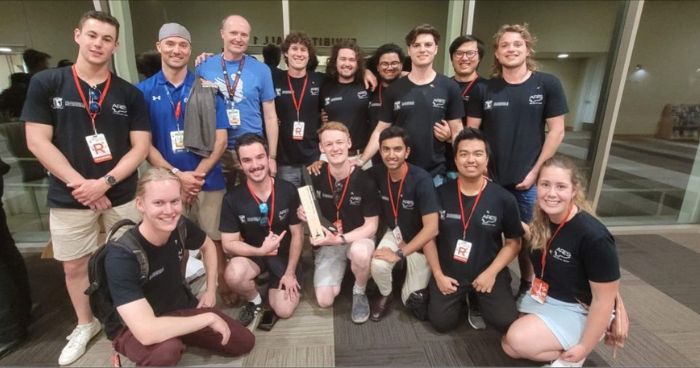ARES Rocketry team wins the Charles Hoult Award at the 2022 Spaceport America Cup

The University's Aerospace and Rocket Engineering Society (ARES)'s Rocketry Team has impressed judges at the 2022 Spaceport America Cup (SAC) with their technical excellence and is bringing home the Charles Hoult Award for Modelling and Simulation.
The Award for Technical Excellence recognised the team's design, analysis and manufacture of a 10,000-foot (3048-metre) sounding rocket with air frame diameter transition.
After two long years without campus access, the team leapt at the first opportunity to build their team rocket ‘Big Blue’ once COVID restrictions eased late in 2021.
The team launched their new and improved rocket Sprocket at the 2022 SAC.
The ARES Rocketry Team was formed in 2019 and is led by Professor Richard Sandberg, Chair of Computational Mechanics in the Department of Mechanical Engineering.
The ARES student society is affiliated with and sponsored by the Faculty of Engineering and Information Technology.
Sprocket, short for spaceport rocket, stands 2.75 metres tall.
It has a unique transition design to reduce drag and delivers a 3U format payload to a 10,000-foot (3048-metre) apogee.
It also has a Student Researched and Designed (SRAD) flight computer, which includes a Teensy 3.6, a pressure sensor, an inertial measurement unit (IMU), GPS and a camera.
Harrison Dean, ARES President and Master of Engineering student, said the team was delighted with their success.
“Our avionics and payload team developed and constructed a self-researched flight computer and payload. The self-made flight computer that is on our Spaceport Rocket is particularly ambitious, as most rocketry teams use off-the-shelf flight computers,” Mr Dean said.
SAC is an annual global intercollegiate rocket engineering conference and competition.
More than 110 teams attended this year, with teams of student rocketeers encouraged to fire rockets to altitudes of 10,000 to 30,000 feet (3048 – 9144 metres).
For more information: https://eng.unimelb.edu.au/ares/about/rocketry-team